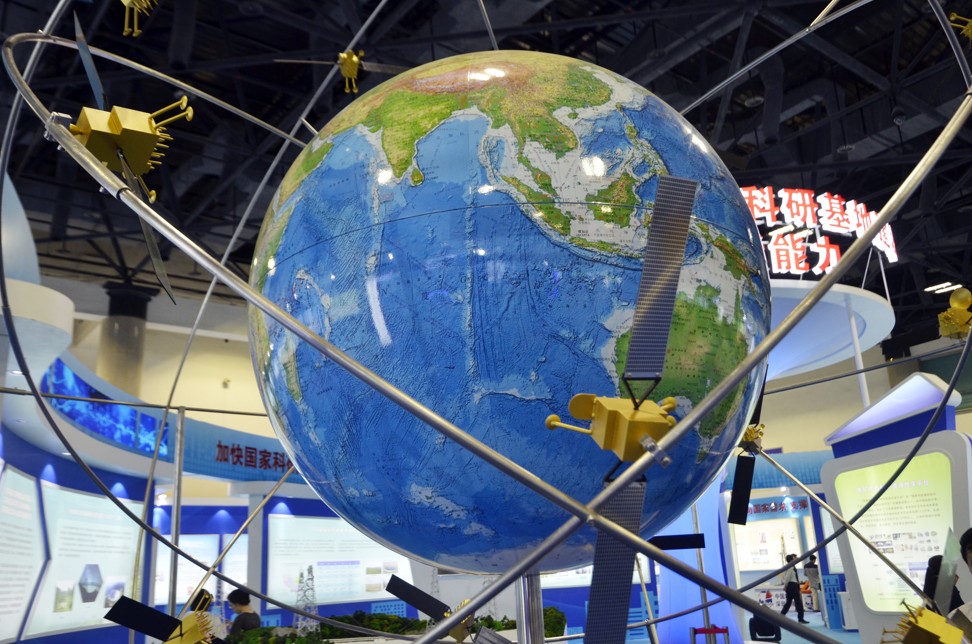
China to launch new GPS rival satellites ‘accurate to within millimetres’, website says
Beidou-3 craft may be put in orbit later this month, according to aerospace website, with operators confirming launch coming ‘soon’
China plans to launch its most powerful positioning and navigational satellites later this month, according to an aerospace website, with their makers claiming the technology is accurate to within millimetres.
Two Beidou-3 satellites are expected to be launched on September 29, the website 91fly.cn reported, with developers saying the system was 10 times more precise than GPS.
Evidence that the launch may be imminent was also suggested by the official military newspaper PLA Daily on Monday.
A Yuanwang-class surveillance vessel left a military harbour in eastern China’s Jiangsu province on Sunday for the Pacific Ocean for a satellite tracking mission, the newspaper said, without providing any more details.
An official at Beidou’s operator, the China National Administration of Global Navigation Satellite Systems and Applications, told the South China Morning Post the launch would be “soon”, but did not elaborate.
Beidou-3 is a new generation satellite developed by China to provide positioning and navigation services around the globe. China initiated the Beidou programme, also known as Compass, in the 1990s to compete with GPS, which was developed in the United States.
The 91fly.cn website, run by Chinese aerospace enthusiasts, has previously accurately predicted launch dates. It said the two Beidou-3 satellites would be blasted into orbit on a CZ-3B Long March from a launch centre in Sichuan province.
The two craft were originally scheduled for launch in July, but the mission was postponed after two consecutive failures of Long March rockets on other satellite missions.
The second failure of a heavy-lifting CZ-5 rocket in early July led to the loss of the largest satellite China had ever built and prompted space authorities to put back further launches.
Li Min, a researcher at the National Engineering Centre for Satellite Positioning Systems at Wuhan University, said Beidou-3 would be the most advanced positioning and navigational satellite on the planet.
“It is the new boy in town ... with some of the latest technology,” said Li, who was involved in China’s military positioning satellite research programmes. He declined to give details of the military applications for the technology.
Yang Yuanxi, deputy chief designer of the Beidou system, told state media earlier this year that the latest satellites would be at least 10 times more precise than existing models.
These were accurate to centimetres, similar to the US-developed GPS, he said.
The satellite navigation system calculates a user’s location by measuring tiny differences in the arrival time of electromagnetic pulses from several positioning probes in the sky, but a new atomic clock on Beidou-3 could reduce the margin of error to a few millimetres.
Li, however, was more cautious, adding that the performance of Beidou-3 would need to be evaluated after use.
“In real life, accuracy is not only affected by atomic clocks, but also how well these satellites work together in a large, sophisticated array,” he said.
The improved accuracy of Beidou-3 would hardly be noticeable to most civilian users, he said. Only the military or organisations authorised by the government, however, would be able to get access to the ultra-high accuracy service for special tasks, he said.
The Beidou programme will need more than 30 of the new satellites to cover every corner of the globe. Over a dozen satellites are still waiting for launch, with the initiation of the global service scheduled before 2020.
The launch of Beidou-3 comes at a politically sensitive time in China, with the five-yearly party congress set to open in Beijing next month. There is likely to be a major reshuffle of the country’s top leadership at the event as President Xi Jinping begins his second term in office.


